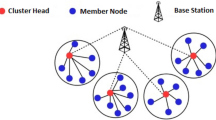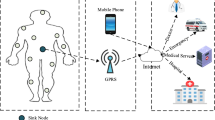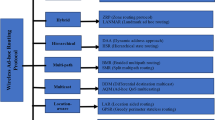Abstract
The mobile Ad Hoc network (MANET) is a self-organizing and self-configuring wireless network, consisting of a set of mobile nodes. The design of efficient routing protocols for MANET has always been an active area of research. In existing routing algorithms, however, the current work does not scale well enough to ensure route stability when the mobility and distribution of nodes vary with time. In addition, each node in MANET has only limited initial energy, so energy conservation and balance must be taken into account. An efficient routing algorithm should not only be stable but also energy saving and balanced, within the dynamic network environment. To address the above problems, we propose a stable and energy-efficient routing algorithm, based on learning automata (LA) theory for MANET. First, we construct a new node stability measurement model and define an effective energy ratio function. On that basis, we give the node a weighted value, which is used as the iteration parameter for LA. Next, we construct an LA theory-based feedback mechanism for the MANET environment to optimize the selection of available routes and to prove the convergence of our algorithm. The experiments show that our proposed LA-based routing algorithm for MANET achieved the best performance in route survival time, energy consumption, energy balance, and acceptable performance in end-to-end delay and packet delivery ratio.
Similar content being viewed by others
References
L. Blazevic, L. Buttyan, S. Capkun, et al. Self-organization in mobile ad-hoc networks: the approach of terminodes [J]. IEEE Communications Magazine, 2001, 39(6): 166–174
R. Bruno, M. Conti, E. Gregori. Mesh networks: commodity multihop Ad Hoc networks [J]. IEEE Press, 2005, 43(3): 123–131
Z. Yang, Y. Liu. Understanding node localizability of wireless Ad Hoc and sensor networks [J]. IEEE Transactions on Mobile Computing, 2012, 11(8): 1249–1260
M. A. Rahman, M. S. Hossain. A location-based mobile crowdsensing framework supporting a massive Ad Hoc social network environment [J]. IEEE Communications Magazine, 2017, 55(3): 76–85
N. T. Dinh, Y. Kim. Information-centric dissemination protocol for safety information in vehicular ad-hoc networks [J]. Wireless Networks, 2017, 23(5): 1359–1371
S. J. Lee, W. Su, M. Gerla. Wireless Ad Hoc multicast routing with mobility prediction [J]. Mobile Networks and Applications, 2001, 6(4): 351–360
B. An, S. Papavassiliou. MHMR: Mobility-based hybrid multicast routing protocol in mobile Ad Hoc wireless networks [J]. Wireless Communications and Mobile Computing, 2003, 3(2): 255–270
A. Bentaleb, S. Harous, A. Boubetra. A weight based clustering scheme for mobile Ad Hoc networks [C]//The 11th International Conference on Advances in Mobile Computing and Multimedia, Vienna, 2013: 161–166
S. Guo, O. Yang. Maximizing multicast communication lifetime in wireless mobile Ad Hoc networks [J]. IEEE Transactions on Vehicular Technology, 2008, 57(4): 2414–2425
H. B. Thriveni, G. M. Kumar, R. Sharma. Performance evaluation of routing protocols in mobile ad-hoc networks with varying node density and node mobility [C]//International Conference on Communication Systems and Network Technologies, Gwalior, 2013: 252–256
R. Suraj, S. Tapaswi, S. Yousef, et al. Mobility prediction in mobile Ad Hoc networks using a lightweight genetic algorithm [J]. Wireless Networks, 2016, 22(6): 1797–1806
T. Manimegalai, C. Jayakumar, G. Gunasekaran. Using animal communication strategy (ACS) for MANET routing [J]. Journal of the National Science Foundation of Sri Lanka, 2015, 43(3): 199–208
G. Singal, V. Laxmi, M. S. Gaur, et al. Moralism: mobility prediction with link stability based multicast routing protocol in MANETs [J]. Wireless Networks, 2017, 23(3): 663–679
Selvi, F. A. Pitchaimuthu. Ant based multipath backbone routing for load balancing in MANET [J]. IET Communications, 2017, 11(1): 136–141
A. Kout, S. Labed, S. Chikhi, et al. AODVCS, a new bio-inspired routing protocol based on cuckoo search algorithm for mobile Ad Hoc networks [J]. Wireless Networks, 2017(9): 1–11
J. Liu, Y. Xu, X. Jiang. End-to-end delay in two hop relay MANETs with limited buffer [C]//Second International Symposium on Computing and Networking, Shizuoka, 2015: 151–156
S. Chettibi, S. Chikhi. Adaptive maximum-lifetime routing in mobile ad-hoc networks using temporal difference reinforcement learning [J]. Evolving Systems, 2014, 5(2): 89–108
A. Petrowski, F. Aissanou, I. Benyahia, et al. Multicriteria reinforcement learning based on a Russian doll method for network routing [C]//IEEE International Conference Intelligent Systems, London, 2010: 321–326
P. Vijayalakshmi, S. A. J. Francis, J. A. Dinakaran. A robust energy efficient ant colony optimization routing algorithm for multi-hop Ad Hoc networks in MANETs [J]. Wireless Networks, 2016, 22(6): 2081–2100
S. Chettibi, S. Chikhi. Dynamic fuzzy logic and reinforcement learning for adaptive energy efficient routing in mobile ad-hoc networks [J]. Applied Soft Computing, 2016,38: 321–328
P. Srivastava, R. Kumar. A new QoS-aware routing protocol for MANET using artificial neural network [J]. Journal of Computing and Information Technology, 2016, 24(3): 221–235
S. K. Das, S. Tripathi. Intelligent energy-aware efficient routing for MANET [J]. Wireless Networks, 2016(7): 1–21
K. S. Narendra, M. A. L. Thathachar. Learning automata: An introduction [M]. USA: DBLP, 2012
M. A. L. Thathachar, P. S. Sastry. A hierarchical system of learning automata that can learn the globally optimal path [J]. Information Sciences, 1987, 42(2): 143–166
H. Beigy, M. R. Meybodi. Utilizing distributed learning automata to solve stochastic shortest path problems [J]. International Journal of Uncertainty, Fuzziness and Knowledge-Based Systems, 2006, 14(05): 591–615
M. L. Thathachar, P. S. Sastry. Varieties of learning automata: an overview [J]. IEEE Transactions on Systems Man & Cybernetics Part B Cybernetics A Publication of the IEEE Systems Man & Cybernetics Society, 2002, 32(6): 711–722
A. A. Anasane, R. A. Satao. A survey on various multipath routing protocols in wireless sensor networks [J]. Procedia Computer Science, 2016, 79: 610–615
D. B. West. Introduction to graph theory [M]. 2nd ed. USA: McGraw-Hill Higher Education, 2005: 260
I. Das, D. K. Lobiyal, C. P. Katti. Multipath routing in mobile Ad Hoc network with probabilistic splitting of traffic [J]. Wireless Networks, 2016, 22(7): 2287–2298
H. J. Kushner. Approximation and weak convergence methods for random processes, with applications to stochastic systems theory [M]. USA: MIT Press, 1984
G. Wahba. Erratum: spline interpolation and smoothing on the sphere [J]. Siam Journal on Scientific & Statistical Computing, 2012, 2(2): 5–16
J. Chen, W. Li. Convergence behaviour of inexact Newton methods under weak Lipschitz condition [J]. Journal of Computational & Applied Mathematics, 2006, 191(1):143–164
G. A. Anastassiou, S. G. Gal. Approximation theory: Moduli of continuity and global smoothness preservation [M]. USA: DBLP, 2000
G. F. Riley, T. R. Henderson. The ns-3 network simulator [J]. Modeling and Tools for Network Simulation, 2010: 15–34
M. S. Khan, Q. K. Jadoon, M. I. Khan. Mobile and wireless technology 2015: A comparative performance analysis of MANET routing protocols under security attacks [M]. Germany: Springer Berlin Heidelberg, 2015, 310: 137–145
Author information
Authors and Affiliations
Corresponding author
Additional information
This work is supported by the National Natural Science Foundation of China (No. 61772386), Guangdong provincial science and technology project (No. 2015B010131007). The associate editor coordinating the review of this paper and approving it for publication was W. Quan.
Sheng Hao was born in Lanzhou. He received his B.E. and M.S. degrees in computer science and technology from Wuhan University. He is now a Ph.D. candidate of architecture. His research interests include wireless network, communication theory and complex network theory.
Huyin Zhang [corresponding author] was born in Shanghai. He received his Ph.D. degree in computer science and technology from Wuhan university. He is a professor of Wuhan university. His research interests include high performance computing, network quality of service, new generation network architecture.
Mengkai Song was born in Wuhan. He received his undergraduate degree in computer science and technology from Wuhan university. He is now a graduate student of computer network. His research interests include wireless network and differential privacy.
Rights and permissions
About this article
Cite this article
Hao, S., Zhang, H. & Song, M. A Stable and Energy-Efficient Routing Algorithm Based on Learning Automata Theory for MANET. J. Commun. Inf. Netw. 3, 52–66 (2018). https://doi.org/10.1007/s41650-018-0012-7
Received:
Accepted:
Published:
Issue Date:
DOI: https://doi.org/10.1007/s41650-018-0012-7




